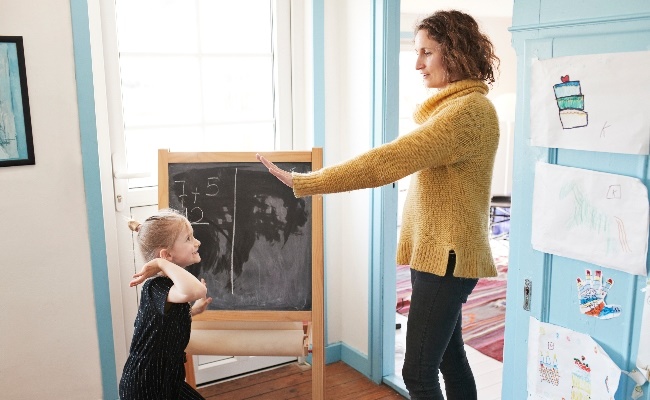
You know you should feel over the moon. After all these months of nagging and tearing your hair out as you try to homeschool your kids, there’s an end in sight at last.
But now that most learner will be back at school by the end of August, you have mixed feelings.
On the one hand, it’ll be great to hand them back into the care of their teachers and have the responsibility of educating them off your shoulders – but on the other it opens a whole new can of worms.
After all these months of doing everything in your power to keep them away from other people, it feels weird to be gearing up to send them out into the world, especially if you’re still working from home.
Mask or no mask, how safe will they really be sitting in a classroom with their fellow learners?
And you might also have people in your home who are particularly vulnerable – grandparents, for instance, or adults with comorbidities.
Kids don’t seem to be as affected by the virus but what about adults who are most at risk?
JOIN OUR ONLINE SEMINAR: Expert answers to your burning questions about home-schooling
It’s a concern shared by many parents and it’s exactly for this reason that the department of education has announced that those who don’t want to send their children back to school don’t have to do so.
But this doesn’t mean those kids are going to take the rest of the year off. Parents are legally obliged to formally register them with the department for lockdown learning – a form of home-schooling – and then teach them at home themselves or hire a tutor for the job.
Thinking of going this route? Here’s what you need to know.
What the law says
The South African Schools Act obliges every parent to send every child between the age of seven and 15 to school.
The act also states that any person who prevents a learner from attending school without good reason is guilty of an offence and liable on conviction to a fine or imprisonment for a period of up to six months.
But concern about the Covid-19 pandemic is definitely a good enough reason to keep your kids out of school.
Basic education minister Angie Motshekga recently announced that parents who feel anxious about sending their children back to school due to fear or because of comorbidities such as asthma, which could put them at additional risk if they got infected, can keep them at home – provided they register them for home education or lockdown learning.
“A parent is responsible for their child’s wellbeing, which includes their educational wellbeing, according to the Children’s Act.
“Therefore removing a child from a dangerous situation is one way of ensuring the child’s wellbeing,” says Karin van Oostrum from home-schooling organisation Pestalozzi Trust.
“The school will understand you have your child’s best interests at heart and will accept your reasons,” she adds.
Requirements for lockdown learning
The South African Schools Act stipulates that parents can apply for an entire, partial or conditional exemption from compulsory school attendance if it’s in the best interests of the learner. These parents then have an obligation to ensure their kids don’t fall behind with their studies.
Right now parents have two options: they can either register for lockdown learning or home education. Lockdown learning is for those who plan to teach their kids at home until the danger posed by the virus recedes, but those who opt for home education intend keeping them out of school indefinitely.
Lockdown learning is a partial or conditional home-schooling measure to accommodate learners with comorbidities or those who are sick or affected by the pandemic in other ways, according to the Gauteng department of education.
“This category of learner is still considered to be part of the school, thus will maintain their EMIS [Education Management Information System] numbers (a unique school identification student number) and be accounted for on all our schooling databases,” says Gauteng education MEC Panyaza Lesufi.
And as such, parents will still be liable for fees. Those struggling to pay fees because of unemployment can apply for a fee exemption, whether they’re sending their kids to school or keeping them at home and doing lockdown learning.
So not being able to pay school fees won’t be a sufficient reason for electing to keep your kids at home.
Duties of parents and caregivers
It’s a big responsibility for parents to take on schooling their kids and you need to be certain you have the time and resources to give them the attention they need.
The South African Schools Act stipulates that education received by a learner at home must at least meet the minimum requirements of the curriculum at public schools and you’ll need to provide constant evidence to prove your child is on track.
After registering a child for lockdown learning or home education, parents will be required to perform the following duties:
Source all training material (books and so on) at their own expense.
- Keep a record of attendance.
- Keep a portfolio of the learner’s work as well as evidence of intervention and other education support given. Such records must be made available for inspection by an authorised official of the provincial department of education.
- Contact the principal of your kids’ school regularly to keep in touch with the latest developments in education.
- If you have children in Grade 9 and upwards and decide to home-school them indefinitely you still need to register them at a public or independent school in order for them to qualify for registration for the National Senior Certificate examinations.
How much teaching do kids need?
As schools reopen the aim is for at least three hours of contact-teaching time per schoolday, but for parents who are home-schooling their children it’s recommended they aim for the following per week:
- Grades R-2: 23 hours
- Grade 3: 25 hours
- Grades 4-12: 27-and-a-half hours Deon Louw, deputy director for institution management and governance at the Western Cape education department, recommends the following routine for older kids (Grades 7 and up):
- Teach from 8am to 3pm, giving your child two breaks of 20 minutes each.
- This includes time for homework, which they’re expected to complete without your assistance.
- Mark their work – just as their teacher would.
What support will parents receive?
The provinces are all planning different things. In Gauteng, for instance, the department of education says its districts will organise 14-day lockdown learning activity packs (Laps) for learners.
Districts will include centralised timetables with suggested timeframes for specific subjects to help ensure learning is effectively organised at home. Check with your child’s school to see what the different requirements are in each province.
What curriculum needs to be followed?
Parents who permanently homeschool their kids can choose their own curriculum but for lockdown learning you must stick to the curriculum your child is already following at school – the Curriculum Assessment Policy Statements (Caps), in most cases.
“Parents are responsible to see that children do the necessary test or worksheets as per the curriculum requirements,” Louw says.
And if the child is still at home when it’s time for end-of-year exams, parents must get an assessor (any qualified educator) to assist with the assessment of the child.
“The assessor will provide the necessary input with regard to where a child must be educationally speaking and the move to the next grade,” Louw explains.
Ask your child’s school for help on how to secure an assessor. Caps material and other online resources for home education and lockdown learning can be found on the department of basic education (DBE) website at www. education.gov.za.
How to apply for lockdown learning
Parents who’d like to home-school their children during the lockdown should go to the school where the child is enrolled and ask for application forms for lockdown learning. Alternatively forms for the various provinces can be found on the DBE website.
This application form must be completed in full by a parent or guardian and must be accompanied by the requested supporting documents, which include a motivation letter for why home-schooling is required.
Lesufi says Gauteng schools can apply on a parents’ behalf through the district department. “Application approval will be done within seven days and parents will be provided with a curriculum to follow,” he adds.
Alternatively, parents can consult the DBE website to find home-education coordinators in their district to help with the application process.
- Join the Pestalozzi Trust (pestalozzi. org). It costs R1 200 a year and gives you access to expert advice on all home-schooling matters.
- Parents can also join the Facebook group Lockdown Schooling@Home SA for free tips from veteran home-schoolers.
- Keep communication channels with your child’s school open at all times and inform them if you intend on eventually returning your child to school.
- Organise your child’s learning materials. Use what you have at hand. Buy what you can afford or what works best for you now.
- Gather information on registration for home-schooling by visiting the department of basic education’s website at education.gov.za.
More frequently asked questions
Do home-schooled children have to stick to the set school term? No, parents can follow their own plan, but need to cover all the work.
What does your home need to make it an environment that’s suitable for home-schooling? A parent should allocate an appropriate teaching and learning space within the home, according to the department of basic education’s home-education policy. Such a space should include the following as basic minimum requirements:
- An area that’s conducive for the learner to complete their education programme.
- An area (or access to an area) for physical education or social play within the surroundings of the home or community.
Will I still need to keep paying school fees? The department of education has made it clear that parents who are opting for lockdown learning must continue to pay school fees while their child remains registered at a school.
“It’s important to keep contact with the school where your child is registered regarding your plans for the upcoming months home-schooling expert Karin van Oostrum says. “You need to make it clear to your school that you intend returning your child after the danger has passed.”
If I decide to deregister my child now and re-register after Covid-19, will my child automatically be guaranteed a place? Kids who are deregistered will be treated like any new learner applying for a place in the school. So if you remove your children from school you might struggle to get them back in later.
If you plan to return your child to the school next year or after the Covid-19 chaos is over, contact the school directly to find out what exactly would be required for readmission, Van Oostrum says.
- If possible, try to allocate a dedicated space. A room separate from the child’s bedroom that can serve as a classroom would be best.
- Involve your child in the setup – that way they’ll be more likely to be excited about spending time in the room.
- Keep it light. If the room doesn’t have a good natural source of light invest in a quality desk lamp.
- Have a dedicated no-noise time. If you have younger children, make it clear that between a certain time of day noise must be kept to a minimum so their older sibling can concentrate on their work.
- Keep the room clutter free. Piles of toys provide easy distractions so make sure that before your child starts school, they clean up their room and that all temptations are packed away in a cupboard.
- Make it a rule that when school is in session, cellphones are banned. Your child won’t be able to concentrate if they’re checking their phone every few minutes.
EXTRA SOURCES: SOUTH-AFRICAN-HOMESCHOOL-CURRICULUM. COM, TIMESLIVE.CO.ZA, WESTERNCAPE.GOV.ZA, WWW.GOV.ZA. ENCA.CO.ZA, CAPETALK.CO.ZA, EWN.CO.ZA, BUSINESSTECH.CO.ZA, ELRC.ORG.ZA, STARTINGHOMESCHOOLING.CO.ZA, PESTALOZZI.ORG




 Publications
Publications
 Partners
Partners




















